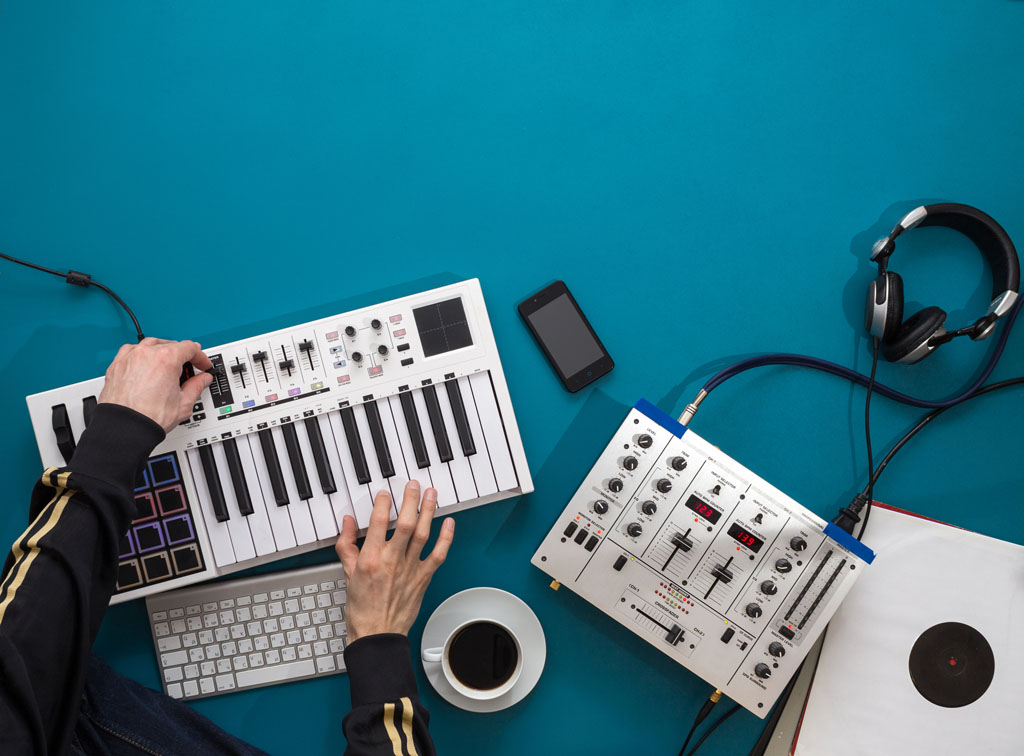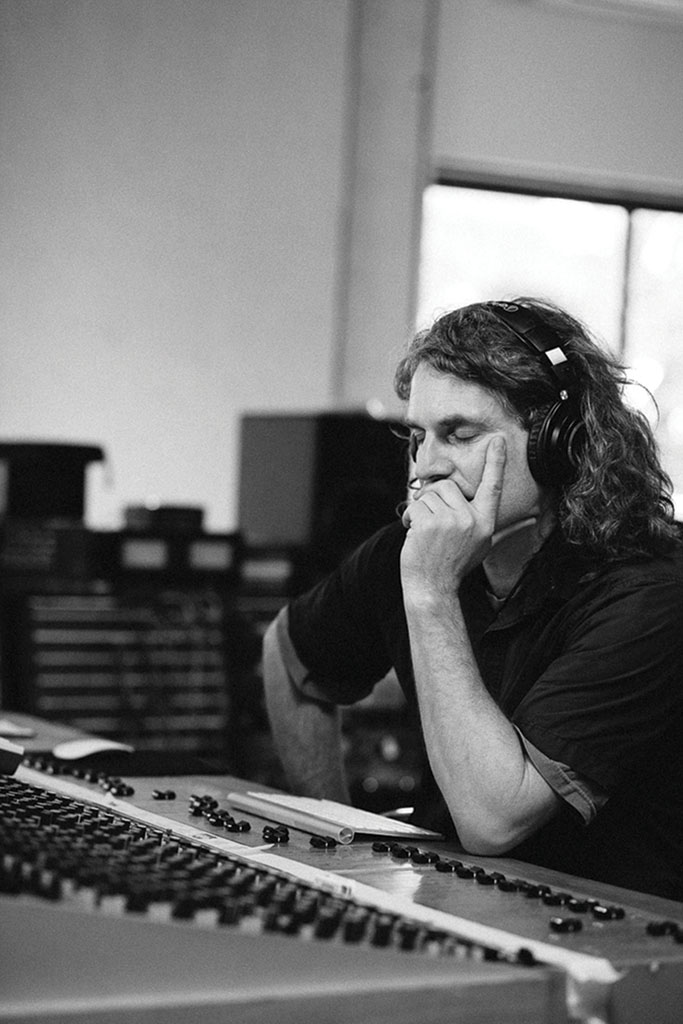LISTEN HERE
16 Nov 2023
Multitrack-Tasking for Producers

Subscribe to CX E-News
PART 2
In this second instalment of our exploration of what it takes to be a music producer, we delve into the psychology of how a producer thinks, what roles they might play in the studio, and how they read the room (and make coffee).
In the last issue of CX I penned some thoughts on roles a music producer typically plays in a studio environment; what he or she might do, how they might behave and the tasks they’re often expected to perform throughout a production process.
What was hopefully laid bare in the last article is that the role of a music producer is often an ambiguous, sometimes ill-defined one, mainly because no two albums are ever alike, which means the producer’s role is always different, in subtle, and sometimes substantial, ways.
Fundamentally, this means that above all else, a producer must be flexible and nimble, often acting like the missing pieces of a jigsaw puzzle, each time providing different shapes to complete the picture. He or she must intuit the role to suit the specific circumstances of every unique artistic endeavour, adding in a healthy dose of sensitivity, imagination and wit along the way. A producer is never a tyrant or an autocrat.
In Part 1 of this conversation, we discussed how to judge whether to get involved in a project in the first place, by building up a list of ‘known quantities’ to help you make the decision based on facts rather than guesswork. We touched on costs, and related to that, the scale of the project. We also considered how you might develop a ‘vision’ for the project, particularly when that notion feels like an impossible task, by starting off with a list of things the album definitely WON’T be.
Getting Down To It
But now it’s time to discuss producing the album itself, not merely laying down the groundwork.
This is a huge topic of course, so forgive me if I gloss over the areas where you’d have preferred more detail – for that I’d need a book. (And if you really want more info on a specific aspect of production, please email me, and perhaps I will respond with another article.)
As a producer myself, my lasting impression of the work I’ve done over the year is that albums are invariably the sonic accumulation of the personalities involved. By that I mean, the sounds of the records have always, to a large extent, been the result of the musicians I’ve chosen for a project (as well as the ones that were already bound to it), rather than what mics I’ve chosen, or which studio I worked in. People, in the end, impart the biggest sonic imprint.
With that in mind, two of the most significant tasks a producer generally performs is determining who will play on an album and what instruments will comprise its sonic palette, depending of course on how much of this is predetermined by the nature of the project: a solo artist with no musical friends or collaborators might bookend one side of the spectrum, a well-established band, the other.
Either way, the choices you make at this juncture have a huge bearing on the outcome: on the vibe of the production, the nature of the performances, the recording methods and techniques, the location, and the overall experience.
And it’s this last idea – the experience of making the album – that everyone invariably takes home with them. A good producer knows this all too well, of course, striving always to forge lasting memories for those involved: of unexpected musical epiphanies, unforgettable collaborations, happy accidents, and lifelong friendships. If you’re a producer, for your sake as well as others, you must make the production process an enjoyable one, and the reason for this is simple. It’s not the final product that artists, producers and engineers are rewarded with at the end of a project, but rather the memories of being there when the album was made. And strangely enough, when things go really well, sometimes the finished album can feel oddly nostalgic and emotional, reminding you of the time when you all hung out in the studio together; a time that rarely, if ever, repeats. Sadly, sometimes this makes the finished album difficult to listen to, which is an odd, but not uncommon, outcome. In that situation, the album is clearly for the listener, not the musicians who made it.
Every album is different in this regard too. Some albums are done in isolation, with no other human participation, while others might involve a producer, a single artist, and a bunch of instruments, software, loops, samples, and hardware. This is a common approach nowadays. Other albums might require two or three other musicians, sometimes more, perhaps up to 10 or even 20. Others still might involve a tight-knit band and its entourage, all of whom need to be catered for in different emotional and physical ways. Other albums are done on location in a place unfamiliar to everyone, even the producer, while others still are done in the producer’s own space, which is how I mostly roll these days.
There are countless other variations on this theme too: albums that are made over a 30-year timespan, songs pulled together from scraps of previous recordings and then augmented and rearranged to get them over the line, and even live-to-two- track recordings where a musician records in a room with no bells or whistles, printing straight to a dodgy tape machine that may or may not be dropping out mid-performance! Everyone has their own way of doing things, and their own interpretation on what’s cool or constructive. But regardless of which way an album is recorded, the producer needs to be knowledgeable of, and confident in, the hardware and software being used to construct it. Failing that, they need to work with an audio engineer who is.
Getting Results
Although every project is different, there’s at least one thing that’s common to almost every musical endeavour where a producer is involved: at the end of the process a finished product is released to the public.
As the producer of any record, it’s your job to get the album over the line in its best possible form, steering the project through the inevitable rough patches, acting as a guide if people become lost in the process, inspiring and motivating others if the music stagnates, all while leaving space in your head to imagine the next few steps along the path to the finish line.
Sometimes this involves late-night emails to someone you’d like to have play on a song the next day or stepping up to the mic when everyone’s gone home to sing a backing vocal. On other occasions it might involve getting the grand piano tuned, or introducing a new instrument out of left field that might inspire new thinking in others, or a new vibe. You might be the one calling it quits at 7pm, insisting that everyone goes out for a nice sushi dinner, or you might just make coffee for everyone mid-session, kick back in the control room and talk about something else other than the task at hand. A producer needs to be sensitive to the energy levels of others and have the empathy and wit to recognise when it’s time to push someone to capture that great take or stop for a break.
The other thing a producer should be mindful of, especially over the course of a career, is remaining inspired by, and motivated by, music. You have to keep filling yourself up with inspiration in this game: with ideas, new discoveries, and the desire to make music. If you don’t, eventually the cracks will show. The best producers are always the ones who seek nourishment from the music itself.
This doesn’t mean one must keep up with everything that’s happening worldwide in the music ‘scene’ or develop an encyclopaedic knowledge of every musical release over the past eight decades – that’s impossible. But neither does it mean shutting off from the world of new releases (or even old ones) and sticking with old music that you’ve listened to over and over for decades. There’s so much amazing music in the world; there are always hundreds of albums out there that can nourish your musical mind, if only you can clear some headspace for them.
So don’t stop listening to music. If you do, you’ll eventually become a musical cliché, and from there a caricature of your own self.

Strengths & Weaknesses
A great producer is also someone who knows his or her own strengths and weaknesses – technical, musical, or social – a person who never lets their ego get in the way of the best musical solution for the project.
Humility is the key here. If you’re awesome at song writing, arranging music, and performing a bunch of instruments yourself, that’s awesome – you’re no doubt a great asset in the studio. But if this skillset is inseparable from your burgeoning case of undiagnosed narcissism, which always sees you offering yourself up for recording duties while more capable musicians around you sit quietly in the corner, then you’re failing in your job. Don’t be that person if you can avoid it. The personalities around you in the room make the album – so let them!
As the producer, you’re supposed to be the one with the wider view of the project, remember; the one with an acute sensitivity to the vibe in the room and the mood of those around you. Sometimes recording an overdub yourself is the most effective way to get an idea down quickly. I get that. You’ll probably save yourself time if you do, or at least the need for a long-winded explanation. Just be aware, however, that over time, there’s a danger that this approach becomes habit forming, wasteful of the musicians around you, and occasionally downright insensitive. Trust the musicians in your midst. They have insights too.
A Mixer’s Bootlace, Perhaps?
And are you the best person to mix the project? Maybe you’re a great producer, but that doesn’t necessarily mean you’re a mix engineer’s bootlace. If you’re a great producer, but an average mix engineer, maybe you should consider getting someone you know who’s fantastic in that specific role, to mix the album for you? If you don’t, won’t the album you’ve just put all that hard work into lack that final polish it so richly deserves? Surely, as the producer, you can see that. And if you choose to do it yourself, despite your own technical limitations, who benefits from that decision?
No-one.
The last thing to be mindful of as the producer of any record is simply this: whose name will be on the front cover when the album comes out? If it’s not yours, then whose? For that person specifically, you need to be striving towards making a great record throughout the project – your name will be on the back, and almost no-one reads the credits! The artist needs you to produce an album for them that they can be proud of, take ownership of, and feel excited about when they head out the door to promote it.

Andy Stewart owns and operates The Mill in the hills of South Gippsland. He’s happy to respond to any pleas for production, recording, mixing or mastering help… contact him at: andy@themill.net.au
Subscribe
Published monthly since 1991, our famous AV industry magazine is free for download or pay for print. Subscribers also receive CX News, our free weekly email with the latest industry news and jobs.






